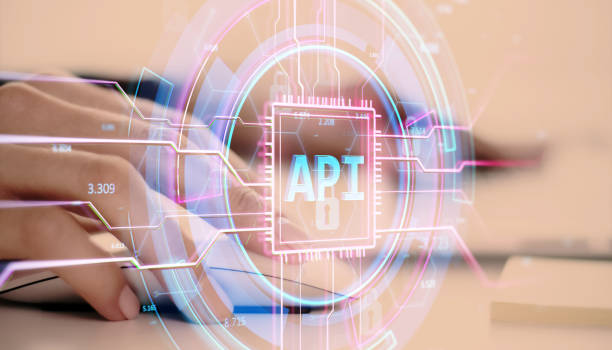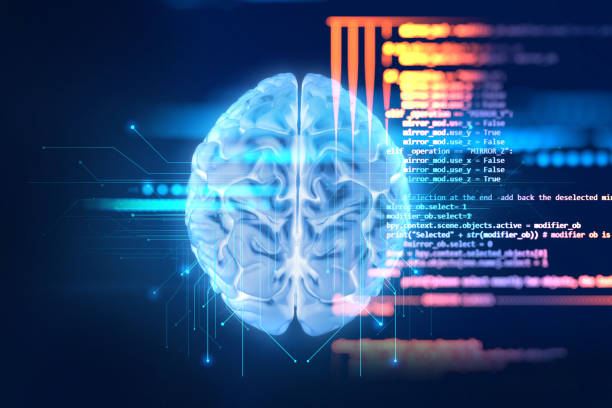What is Artificial Intelligence? Definitions and Fundamental Concepts
#Artificial_Intelligence (AI) in short, is the imitation of human intelligence processes by machines, especially computer systems.
These processes include learning (acquiring information and rules for using information), reasoning (using rules to reach definitive or approximate conclusions), and self-correction.
The main goal of artificial intelligence is to create systems that can perform tasks that typically require human intelligence.
These tasks can include understanding natural language, recognizing patterns, solving problems, and making decisions.
Key areas in #Artificial_Intelligence include machine learning, natural language processing, robotics, and computer vision.
Machine learning allows machines to learn from data and improve their performance without explicit programming.
Natural language processing allows machines to understand and produce human language.
Robotics deals with the design and construction of robots that can perform physical tasks.
Computer vision allows machines to understand and interpret images. Artificial intelligence is currently used in many fields, including medicine, finance, and manufacturing, and is expected to play an even more important role in our lives in the future.
Are you bothered by losing customers due to an old-fashioned appearance or slow speed of your online store? The expert Resaweb team solves these problems with professional online store design!
✅ Increase customer trust and brand credibility
✅ Amazing speed and excellent user experience
Get a free consultation with Resaweb now ⚡
History of Artificial Intelligence: From Idea to Reality
The idea of artificial intelligence dates back to the 1950s, when researchers began exploring the possibility of building machines that could think like humans.
One of the early milestones was the invention of the Turing machine, a theoretical model of computation that showed it was possible to build machines that could perform any calculation.
The Dartmouth Conference in 1956 is considered the official starting point of #Artificial_Intelligence as an academic discipline.
In the 1960s and 1970s, significant advances were made in the field of artificial intelligence, including the development of programs that could play chess and solve mathematical problems.
However, this period also faced limitations, as researchers realized that solving complex problems was much more difficult than they had imagined.
In the 1980s and 1990s, interest in artificial intelligence increased again, especially with the development of expert systems that could model the knowledge of experts in a particular field.
However, these systems also faced limitations, as they were difficult to maintain and update.
Today, #Artificial_Intelligence is experiencing a real renaissance, especially thanks to recent advances in machine learning and increased access to big data.
These advances have made it possible to develop artificial intelligence systems that can perform tasks that were previously considered impossible.
Types of Artificial Intelligence: Approaches and Classifications
#Artificial_Intelligence can be categorized based on various criteria.
A common method is to categorize based on system capabilities.
Based on this, a distinction can be made between Narrow AI and General AI.
Narrow AI refers to systems that are designed to perform a specific task, such as facial recognition or language translation.
These systems are very good at performing their tasks, but cannot perform other tasks.
General AI refers to systems that can perform any intellectual task that a human can do.
These systems are still under development and do not yet exist.
Another method for classifying #Artificial_Intelligence is to classify based on the learning method.
Based on this, a distinction can be made between supervised learning, unsupervised learning, and reinforcement learning.
Supervised learning allows systems to learn from labeled data.
Unsupervised learning allows systems to find patterns in unlabeled data.
Reinforcement learning allows systems to learn through trial and error.
#Artificial_Intelligence is a broad and complex field, and there are different classifications for it.
Choosing the appropriate method for classification depends on the specific goal.
Understanding the different types of #Artificial_Intelligence is essential for understanding its capabilities and limitations.
| Type of Artificial Intelligence | Description |
|---|---|
| Narrow AI | Designed to perform a specific task |
| General AI | Capable of performing any intellectual task that a human can |
Click here to preview your posts with PRO themes ››
Applications of Artificial Intelligence: From Medicine to Space
The applications of #Artificial_Intelligence are very broad and diverse.
In medicine, #Artificial_Intelligence can be used to diagnose diseases, develop drugs, and provide personalized care.
In finance, #Artificial_Intelligence can be used to detect fraud, manage risk, and provide investment advice.
In manufacturing, #Artificial_Intelligence can be used to improve efficiency, reduce costs, and increase quality.
In transportation, #Artificial_Intelligence can be used to develop self-driving cars, manage traffic, and improve safety.
In space, #Artificial_Intelligence can be used to explore planets, manage resources, and provide support to astronauts.
These are just a few examples of the applications of #Artificial_Intelligence.
As technology advances, the applications of #Artificial_Intelligence are expected to become much broader in the future.
The potential of #Artificial_Intelligence to solve complex problems and improve human life is enormous.
It is important to be familiar with this technology and benefit from its advantages.
Research shows that 80% of customers trust companies with professional websites more. Does your current website gain this trust?
With Resaweb’s corporate website design services, solve the problem of customer distrust and a weak online image forever!
✅ Create a professional image and increase customer trust
✅ Attract more sales leads and grow your business
⚡ Get a free consultation
Machine Learning: The Beating Heart of Artificial Intelligence
Machine learning (ML) is a subset of #Artificial_Intelligence that allows systems to learn from data and improve their performance without explicit programming.
Machine learning algorithms can identify patterns in data and use these patterns to make predictions or decisions.
There are different types of machine learning algorithms, including supervised learning, unsupervised learning, and reinforcement learning.
Supervised learning allows systems to learn from labeled data.
Unsupervised learning allows systems to find patterns in unlabeled data.
Reinforcement learning allows systems to learn through trial and error.
Machine learning is currently used in many fields, including medicine, finance, and manufacturing, and is expected to play an even more important role in our lives in the future.
Machine learning is a powerful tool that can be used to solve complex problems and improve human life.
Understanding the basic concepts of machine learning is essential for understanding #Artificial_Intelligence.
Natural Language Processing: A Bridge Between Humans and Machines
Natural language processing (NLP) is a branch of #Artificial_Intelligence that allows machines to understand and produce human language.
Natural language processing includes tasks such as speech recognition, machine translation, and text summarization.
Speech recognition allows machines to convert human speech into text.
Machine translation allows machines to translate text from one language to another.
Text summarization allows machines to create a summary of a long text.
Natural language processing is currently used in many fields, including customer service, internet search, and language translation, and is expected to play an even more important role in our lives in the future.
Natural language processing is a powerful tool that can be used to improve communication between humans and machines.
Challenges and Limitations of Artificial Intelligence
Although #Artificial_Intelligence has great potential, it also faces challenges and limitations.
One of the main challenges is the need for big data.
Machine learning algorithms need a lot of data to learn.
If there is not enough data, the algorithms cannot learn effectively.
Another challenge is the issue of bias.
If the data used to train the algorithms is biased, the algorithms will also be biased.
This can lead to unfair results.
Another challenge is the issue of explainability.
In many cases, it is difficult to understand why an algorithm made a particular decision.
This can reduce trust in the algorithm.
Finally, there is the issue of ethics.
#Artificial_Intelligence can be used for malicious purposes, such as building autonomous weapons or spreading misinformation.
It is important to ensure that #Artificial_Intelligence is developed and used ethically and responsibly.
| Challenge | Description |
|---|---|
| Need for big data | Algorithms need a lot of data to learn |
| Bias | If the training data is biased, the algorithms will also be biased |
| Explainability | It is difficult to understand why an algorithm made a particular decision |
| Ethics | #Artificial_Intelligence can be used for malicious purposes |
Click here to preview your posts with PRO themes ››
The Future of Artificial Intelligence: Visions and Possibilities
The future of #Artificial_Intelligence is bright and full of potential.
#Artificial_Intelligence is expected to play an even more important role in our lives in the future.
Recent advances in machine learning and increased access to big data have made it possible to develop artificial intelligence systems that can perform tasks that were previously considered impossible.
In the future, #Artificial_Intelligence can be expected to be used in various fields such as medicine, finance, manufacturing, transportation, and space.
However, it is important to also consider the challenges and limitations of #Artificial_Intelligence and ensure that this technology is developed and used ethically and responsibly.
Are you unhappy with low sales on your online store?
Resaweb is your solution for having a professional and high-selling online store.
✅ Significant increase in sales and income
✅ Easy and enjoyable shopping experience for customers
⚡ Get a free consultation from Resaweb now!
The Role of Humans in the Age of Artificial Intelligence
As #Artificial_Intelligence advances, the question arises of what the role of humans will be in the future.
Some people are concerned that #Artificial_Intelligence will lead to job losses.
However, many others believe that #Artificial_Intelligence will create new opportunities for humans.
#Artificial_Intelligence can automate repetitive and tedious tasks and allow humans to focus on creative and strategic tasks.
In addition, #Artificial_Intelligence can help humans make decisions and improve their performance.
It is important for humans to learn new skills to be successful in the age of #Artificial_Intelligence.
These skills include technical skills, problem-solving skills, and communication skills.
By learning these skills, humans can cooperate with #Artificial_Intelligence and benefit from its advantages.
Artificial Intelligence and Ethics: Responsibility Towards Technology
As #Artificial_Intelligence is progressing, the ethical issues related to its use are also becoming more important.
Questions such as who is responsible for the decisions made by #Artificial_Intelligence systems, how can discrimination in #Artificial_Intelligence algorithms be prevented, and how can #Artificial_Intelligence be prevented from being used for malicious purposes, must be examined.
It is important to create an ethical framework for the development and use of #Artificial_Intelligence.
This framework should include principles such as transparency, accountability, and fairness.
In addition, it should be ensured that #Artificial_Intelligence is developed and used ethically and responsibly.
This requires cooperation between researchers, policymakers, and the public.
FAQ
| Question | Answer |
|---|---|
| What is the definition of Hush Masnooei (Artificial Intelligence)? | It is a field in computer science that aims to create intelligent machines that can think, learn, solve problems, and make decisions like humans. |
| Mention some common applications of artificial intelligence. | Includes self-driving cars, voice assistants (such as Siri and Alexa), recommendation systems (such as Netflix and Amazon), facial recognition, and medical diagnosis. |
| What is the difference between Narrow Artificial Intelligence (ANI) and General Artificial Intelligence (AGI)? | Narrow artificial intelligence is specialized in one specific task, while general artificial intelligence possesses a human intellectual ability to perform any cognitive task. |
| What is Machine Learning and its relation to Artificial Intelligence? | Machine learning is a branch of artificial intelligence that focuses on developing algorithms that allow systems to learn from data without explicit programming. |
| What are Artificial Neural Networks? | These are computational models inspired by the structure and function of the human brain, and are used in deep learning to process data and discover complex patterns. |
| Mention some ethical challenges related to artificial intelligence. | Includes issues of privacy, bias in data and algorithms, job loss, and responsibility in case of errors or unfair decisions. |
| What is Natural Language Processing (NLP)? | It is a branch of artificial intelligence that focuses on enabling computers to understand, interpret, and create human language in a useful and interactive way. |
| How can artificial intelligence affect the labor market? | It can lead to the automation of some routine tasks, which requires the retraining of workers and the creation of new jobs in the fields of design, development, and maintenance of artificial intelligence systems. |
| What is Computer Vision? | It is a field in artificial intelligence that enables computers to “see” and understand and interpret images and videos in the same way that humans do, enabling them to recognize objects and faces. |
| What is the importance of data in developing artificial intelligence systems? | Data is the fuel that feeds artificial intelligence systems, especially in machine learning. The quality and quantity of data greatly affect the accuracy and performance of models and their ability to learn and make correct decisions. |
Click here to preview your posts with PRO themes ››
And other advertising agency services Rasa web in the field of advertising
Intelligent report: A professional solution for analyzing customer behavior with a focus on intelligent data analysis.
Intelligent digital advertising: A professional solution to improve SEO ranking with a focus on managing Google Ads.
Intelligent SEO: An effective tool for online growth with the help of Google Ads management.
Intelligent Google Ads: A quick and efficient solution to increase click-through rate by focusing on using real data.
Intelligent link building: An exclusive service for growing digital branding based on optimizing key pages.
And more than hundreds of other services in the field of internet advertising, advertising consulting and organizational solutions
Internet advertising | Advertising strategy | Report advertisement
Resources
What is artificial intelligence? – SAS
,What is artificial intelligence? – Virgool
,What is artificial intelligence? (+ Types, Applications and Benefits) – Faradars
,What is Artificial Intelligence (AI)? Everything you need to know about it – Maktab Khoneh
? Are you looking for a big leap in your online business? Rasavab Afrin paves the way for your success by providing comprehensive digital marketing services including fast website design and professional, SEO, and social media management. With us, experience a powerful and influential presence in the digital world.
📍 Tehran, Mirdamad Street, next to the Central Bank, South Kazerun Alley, Ramin Alley No. 6
“`












